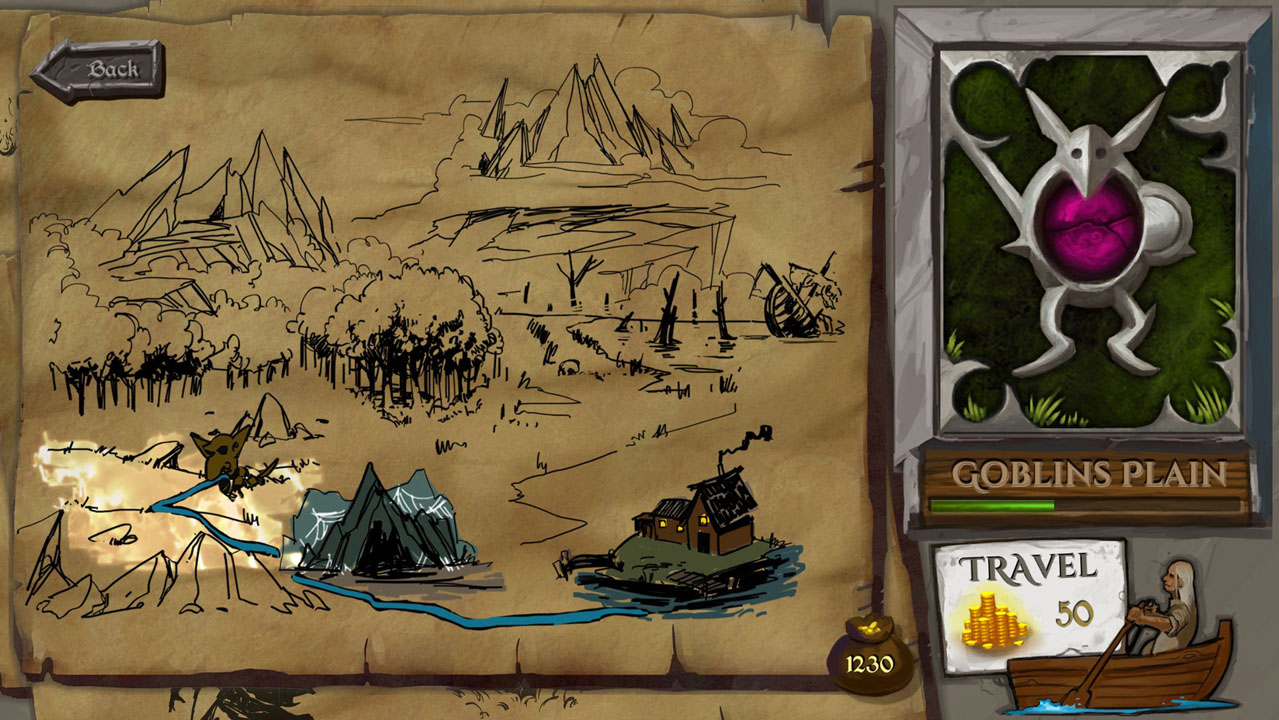Lost In The Dungeon is a deck-building dungeon crawler, developed and published by Eggon Srl. Claims from Eggon Srl's website describe this title as having "[a]n original, simple and intuitive combat system that always maintains a deep strategic component", which, sadly, I did not find to be the case.
It took me five and a half hours to get past what seemed to be the tutorial, although possibly that time also contained the first level. The fact that there isn't a clear transition between those two things is a red flag. Further investigation finds that the inventory, navigation, and combat systems are clunky — not "intuitive". For example, if you have multiples of the same item, they each have their own stack in your inventory. Should you want to delete junk items, you must go through the tedious process of selecting and deleting each one. The lack of conveniences similar to this one adds up, resulting in play feeling more like a chore than like fun.
ALTERNATIVE FACTS

Frustratingly, Lost In The Dungeon also misinforms you in the introduction: "Don't worry if you die," the instructions assure you. But you should worry, because when you die, you not only lose all of the time you spend battling, but you also lose any money you spent during the battle, you don't get any of the XP you would've received had you not died, and you don't get the loot, either. So dying sucks. You gain zero benefit from dying. I learned that a bit too late, thanks to the unhelpful tutorial.
Another problem complicates matters: The difficulty level is too high. When you return to face the same starter monsters again, if you die like I did (which you will), you'll be doing so at an even worse disadvantage than you were at before. For starter monsters, they're really unforgiving, with attacks that sap the life right out of you. This means you have to adopt a conservative playstyle to survive, so anyone who doesn't enjoy playing this way is out of luck. It's a horrible grind where you'll face the weakest monsters over and over in order to earn enough gold to be able to face tougher ones. It's mind-numbingly tedious.
That brings us to yet another problem, which is that battling isn't fun. (If it had been, then all the repetitive battles wouldn't have been a problem.) Luck is such a huge element of battles that it all feels meaningless, as chance makes or breaks you, with seemingly nothing you can do to intervene. All you can do is watch with annoyance as the enemy lucks out, hammering you with their best attacks repeatedly, while you keep drawing cards you don't need. If you happen to have better luck, your choices are so limited that you won’t feel clever for having picked the obviously better ones.
STRATEGY REQUIRES COMPLEXITY
The opportunity for strategy is confoundingly paltry for a title that claims to "always maintain a deep strategic component". You can alter your deck's number of cards and items, but you do not meaningfully choose your cards. The cards you get are tied to what type of hero you choose to be (mage, warrior, or rogue), which you must choose at the outset without any explanation of what those choices entail. It turns out that your hero type impacts what abilities you can choose from, what cards you receive, and what your specialization will be. If you were hoping to get creative and have more than one specialty, or merely pack a surprising trick up your sleeve for vital moments, too bad.
Items are another way to strategize, but when you proceed to a new destination, you don’t know what enemies you'll encounter. Thus, you can’t know what items to prepare yourself with until you've already faced them. Equipping an apt item with 20/20 hindsight feels a lot less satisfying than if you could scout out or research an area to prepare for it.
THE INSCRUTABLES

Some choices the developers made are puzzling. Take, for instance, the fact that you lose your defense levels at the start of each round, despite the fact that it's painstaking to build them up. Why? No other stats are abnormally altered between rounds.
Also, you pay gold during battles to consume potions and antidotes. This isn't coherent in the context of the story, as you're supposed to be in a dungeon. Are you throwing gold coins on the dungeon floor, as a sacrifice to some higher power, in order for the items to work? Yeah… that doesn't make any sense. It would've made much more sense for you to pay for the number of uses of these item cards in the shop. That's what shops are for.
YOU COULD'VE AT LEAST PUT ON A TIE...?
Lost In The Dungeon feels amateurish in every way. In comparison with the best titles in this genre, there's no reason this game should be noticed. Everything — the music, art, gameplay, and narrative — is passable, but lacking life: The music loops over and over, as monotonous as it is uninspired; the hand-drawn art, while charming and competent, lacks pizzazz that was desperately needed; the click-and-drag needed for battle feels stilted, slowing down an already sluggish process; and the dialogue feels like an afterthought, being neither coherent nor compelling.
The Verdict: Flawed
Lost In The Dungeon offers a difficult and tedious challenge for those looking for one. Unfortunately, it isn’t founded on enough complexity to hold your interest for the long term. Lost In The Dungeon has shown its hand, and unfortunately, it doesn’t contain many strategy, polish, or uniqueness cards.


